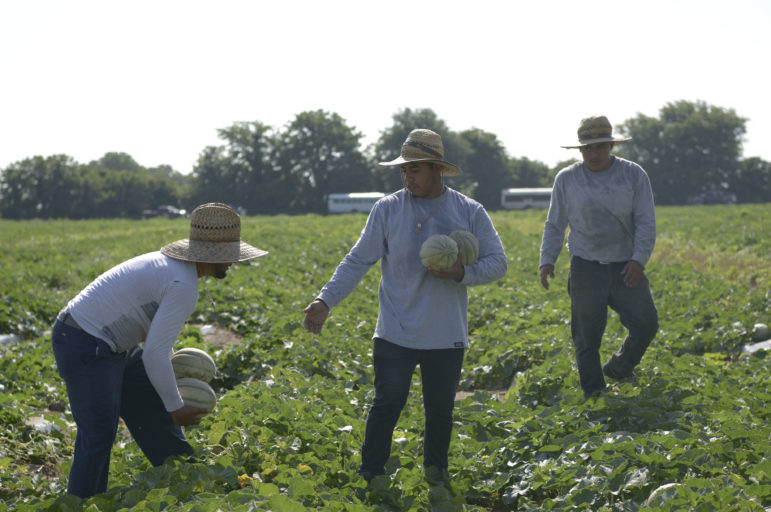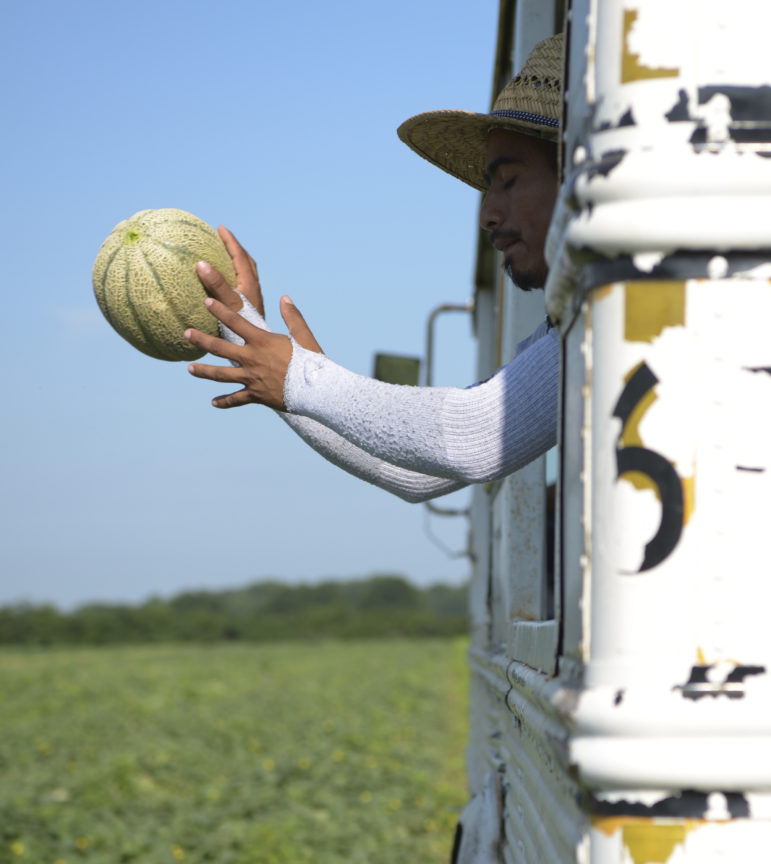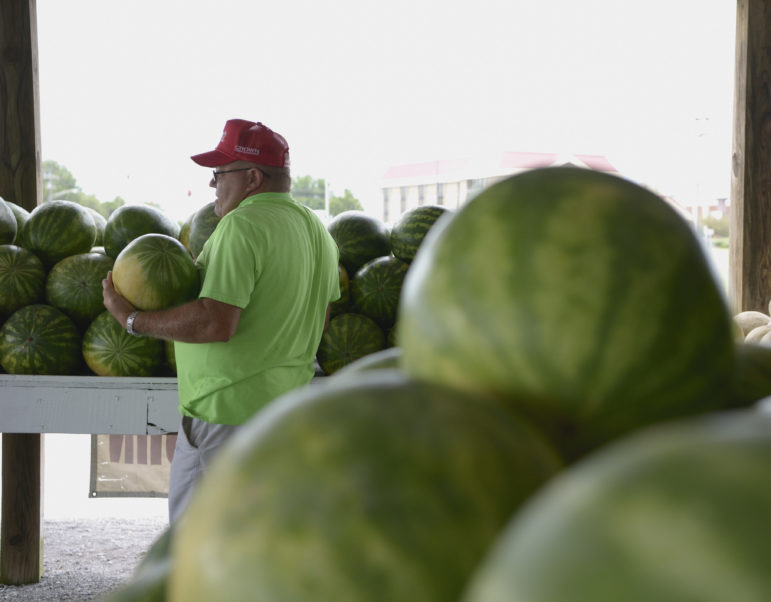
Tina Wimberley rearranges a display of watermelons on July 3, 2019 in Sikeston, Missouri. The produce was picked up near Kennett that morning and brought too Sikeston to sell. Julia Hansen/Photographer

Share
During an incident in Kennett, Missouri, in summer 2018, H-2A workers labored through high temperatures while denied breakfast and with little access to water. Their legal status was supposed to protect them.
This is part one of a two-part story on migrant workers in Missouri. This story was originally published in the M
Dizzy, thirsty, with blurred vision, he kept working. In the field around him, others passed out in the suffocating summer humidity. They were hauled to the only shade available, under a bus. Coming to, they were directed back to work.
He was one of 107 workers from Mexico in the U.S. legally on temporary agricultural, or H-2A, visas, which allowed them to stay here for several months before returning to their home country. Day after day, the crew toiled long hours harvesting watermelons and other produce in Missouri’s Bootheel, but their paychecks didn’t reflect their labor, according to interviews and court records.
In Mexico, H-2A was sold to him as a golden opportunity, he said. He earned $80 a week in construction, and he was told he’d make about $13 an hour in Missouri – an increase he hoped would help provide for his wife and two-year-old daughter. His legal status carried other promises, such as three meals a day and an adequate place to live.
But that didn’t happen, according to court and local records, staffers for an advocacy organization, UMOS, who served as interpreters for federal agents investigating the case, and a member of the crew, who agreed to speak anonymously for fear of retaliation.
The crew was forced to work on empty stomachs and with little water. They lived in a cramped and dirty motel with bed bugs, then a former county jail still surrounded by barbed wire. Some stayed in houses with a leaking toilet and no working refrigerator.
They were also threatened with deportation and blacklisting if they didn’t follow directives, said the worker, who was 20 at the time, through an interpreter. The threats intensified once investigators arrived, he said.
Missouri’s lax inspection system led to the workers’ ordeal, which changed only after the U.S. Department of Labor sued the employer, Jorge Marin, of Florida. The case was dismissed in January (after workers returned home, the restraining order had become “largely moot,” DOL lawyers wrote), but Marin remains under investigation, a DOL spokesman said. (He declined further comment.)
“My intent then was to comply with all the requirements and that is still my intent,” Marin said in response to a list of detailed questions. “There are some claims that are simply incorrect.” Except for access to water, he didn’t specify.
Through it all, the worker said, he tried to remain strong. “I never told them I felt bad,” he said, “because we weren’t very important to them.” Amongst themselves, the workers discussed their problems. H2-A employers are supposed to put up posterslisting workers’ rights and a number to call to complain, but, he said, they didn’t know how to report their employer.
But then a friend’s unlucky break presented an opportunity.

Around 2 a.m. one day in late June 2018, a bus stopped in front of a single-story motel in Kennett, Missouri, population about 10,000. On the ride from the U.S.-Mexico border, the mood was buoyant. In their late teens and early 20s, many had never been to America before. Rest up, the worker remembered being told upon arrival, you’re expected in the fields by daybreak.
Marin told state regulators his crew would work 36 hours a week, with Sundays optional. But their days started around 6 a.m. and ended at 8 p.m. or later. On the bus to the fields each morning, they were warned they’d never be hired again if they didn’t keep working, the worker said.
Water was scarce. The worker shared a container with about 1.5 gallons of water with several other men, he said. When investigators visited, one field had a water cooler, but workers had to drink from a shared Gatorade bottle.
Temperatures regularly topped 80 degrees and, sometimes, the heat index would rocket to 115 degrees. By the time investigators arrived, the crew had worked about 20 straight days in these conditions.
Marin said water was available. “I want you to know that it appears that the DOL overlooked that I believe we had fresh water containers in the fields with every crew,” he said.
Food also proved scarce. Marin contracted with a Mexican restaurant in Kennett to provide lunch and dinner, but workers were denied breakfast.
“The employer felt he didn’t want lazy workers or he didn’t want sluggish workers,” Javier Acevedo, an UMOS interpreter, said workers told him.
To harvest watermelons, workers formed a chain: they bent down low, picked it and heaved it to the next person until it reached a hollowed-out yellow school bus.
“They would not give them breakfast so they had the mobility in the morning to be able to bend down and pick up the watermelons,” said Shirley Aviles, another UMOS interpreter.
“A lot of that just fed into that climate of fear that these workers (felt),” Acevedo said. “They felt exhausted. They felt hungry.” According to local court records, the restaurant provided breakfast on three days, July 17-19. Investigators arrived July 16.
The food Marin did provide was insufficient for their labor, UMOS interpreters said workers told them. “A lot of them did make statements like, ‘I stay hungry. Sometimes I go to bed hungry,’” Acevedo said. Some days, the 20-year-old said, he had nothing to eat.
Workers got to keep one paycheck for $340. But another, for $120, they didn’t. The crew was bused to a bank in a nearby Arkansas town, where they cashed their checks. After exiting, they were forced to hand the money back.
But they lost money before arriving in Missouri.
The workers paid a fee of about $300-$500 to obtain the H2-A visas, Aviles said workers told her. Many workers took out loans to pay it. The 20-year-old said his wife’s family loaned him the money, interest free. He also spent between $100-$150 on travel from his hometown to Kennett.
Charging fees for visas and travel costs is illegal. It wasn’t the first time a Marin crew reported doing so.

In August 2015, Marin sat down with DOL investigators to discuss housing and work violations at an Indiana jobsite. Workers had said they paid about $230 to obtain visas. Marin claimed he reimbursed them, but, investigators noted, “there is no proof.”
Many employers hire firms that recruit workers, help them acquire visas and arrange transportation. Marin hasn’t used these services for the past several years, according to a federal registry of H-2A employers. He paid a recruiter, he said, but he knew nothing about payments for visas.
At the meeting, investigators told Marin charging fees was illegal. According to the investigator, “Mr. Marin agreed to future compliance.”
He was fined $1,650.
In the Bootheel, the 20-year-old weighed whether to make a phone call. Earlier that day, his friend had missed the bus, forcing him to trek to the motel. When he’d arrived, he’d said a man who spoke Spanish – not unusual there – had offered him a ride. The driver had given the friend his number and told him he could help.
The H-2A program’s set-up does not incentivize workers to report abuse, advocates said. By design, employers control almost every aspect of their existence – housing, food, transportation, work hours, whether they remain in America.
Complainers also get blacklisted, said Greg Schell, an attorney who has represented farmworkers for decades. “If they wanted to stay and have the right to come back to the United States in the future,” he said of Marin’s crew, “they had to go with the program and work under the terms given.”
In Missouri between 2015 and 2018, only one H-2A worker complained to authorities about working conditions, according to the state’s log of agriculture worker complaints. Being fired left the worker “homeless in a foreign country,” he wrote. “I now do not have any money to eat on while I travel home, nor do I have transportation to the airport.”
The situation is different in North Carolina.
H-2A workers are members of a union organized by the Farm Labor Organizing Committee. In 2017, more than 700 farmworkers reported employer abuses, according to the committee.
Marin’s crew didn’t have that benefit. The friend didn’t have a cell phone so he asked the 20-year-old to call the driver. He wasn’t sure he could trust the driver, but “it was like our only chance for us to be able to do something,” the worker said later.
The driver picked the two men up at the Wal-Mart near the motel, and he took them to the UMOS office in town. Staffers listened to their story and gave them bottles of water and sanitary packs.
Soon, however, they felt they had to return to the motel. “They thought they were being watched,” said Aviles, who oversees the Kennett office. The driver dropped the men off at the Wal-Mart. To avoid raising suspicion, the 20-year-old said, they made a purchase, placing the UMOS items in one of the store’s plastic bags.
Two days later, the friend dallied in the Wal-Mart parking lot, a phone to his ear. Hungry from work, many on the crew would walk over there at night to buy snacks or bread or meat for sandwiches. Then, he wandered over to the building’s side and jumped in a car with Aviles and other UMOS staffers.
At the UMOS office, he told DOL investigators his experiences.
Others did not.
On July 17, Aviles and an investigator began interviewing workers at the two houses, which were southwest of Kennett. After several interviews, “the agent was like, ‘It’s obvious that they’re coached. They’re telling us the same story,’” Aviles said. “We later found out that Marin had already spoken to them before we got there. They were pretty much like, ‘Everything’s good. We get paid. We didn’t pay anything in Mexico to come here.’”
At one point, Marin drove up. He asked for their business cards, Aviles remembered. “Don’t worry about this,” she said the agent told her before turning to Marin. “All you need is my card,” said the investigator, handing it over. Marin took it and drove away.

With investigators in town, field conditions improved, according to UMOS. Water was more accessible. Tents were set up to escape the sun. Buses ran with A/C for breaks.
At the same time, though, the threats on the morning bus rides escalated, the worker said. We know where your families live, they were told.
Ten days after investigators arrived in Kennett, the DOL requested its injunction: “The workers are compelled to endure the improper housing and field conditions during the remainder of their stay in the United States. Under the terms of their Visas, they do not have the option of finding alternative employment. It is up to the DOL to protect them.” The judge approved it Aug. 6.
By that time, most of the crew had been moved from the motel to the former jail. They’d stayed there about three weeks by the time the judge granted the injunction. Marin had to move them to another motel in Kennett, the 84 West Motel.
By this time, though, the 20-year-old had had enough. He called a family member who lives in the U.S. and asked him to pick him up. He was one of several workers who walked off the job, he said.
In October, the crew’s contracts ended. In January, the case was dismissed. In May, regulators had approved Marin’s request for workers for harvests in Florida and Indiana.
In June, his request for Missouri was approved, too. “I intend,” he said, “for our operation to be fully in compliance with all the applicable laws and regulations.”
About the author
Sky Chadde recently graduated from the Missouri School of Journalism with a graduate degree focusing on investigative reporting. He’s covered Missouri’s legislative sessions for the Columbia Missourian and the St. Louis Post-Dispatch. Before attending grad school, he was a reporter in Texas.

